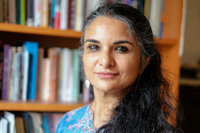非常抱歉,
你要访问的页面不存在,
非常抱歉,
你要访问的页面不存在,
非常抱歉,
你要访问的页面不存在,
验证码:

职称:profrssor
所属学校:University of Minnesota-Twin Cities
所属院系:Science and Technology
所属专业:Science Technologies/Technicians, Other
联系方式:612-624-6006
I was born and raised in the lanes of Chowk in the old city of Lucknow in India, in a lower-middle class joint family of storytellers, theatre workers, house wives and school teachers. I grew up breathing a blend of working- and middle class Hindu and Muslim cultures, and became the first person in my family to learn English in an elite Protestant school of European origin, La Martiniere Girls' School. While the stark contrasts between my school environment and my neighborhood streets made me acutely aware of class, caste, and social location, my home environment instilled in me a passion for popular forms of music, dance, drama and poetry. I began to publish short stories, poems, children's plays and journalistic reviews in Hindi in 1982, and it was around the same time that my geography teacher, Ms. McClure, convinced me that the only way to combine everything I felt passionately about in my life was by becoming a geographer. Shortly thereafter, with my father's encouragement, I began voluntary work with performance artists and activists and received my first lessons in people's theatre and politics of memory and orality. And it was the activists I met while at Awadh College in Lucknow and at the University of Poona, whose voices against dowry, rape, communalism, and casteism sowed the seeds of feminism inside me. From there, I traveled to Minnesota in 1989 to seek a doctoral degree in Geography -- an intense intellectual, political and personal journey that took me to Tanzania to study race and community politics from a feminist perspective. Upon completion of my Ph.D., I taught for two years in the Geography Department at the University of Colorado at Boulder, before returning in 1997 to my new interdisciplinary home in (what was then) Women's Studies at the University of Minnesota. The influences that I grew up with profoundly shaped my intellectual and creative journey in and outside of the academy. My anti-disciplinary work in English and Hindi pushes for multi-genre and multi-sited research, pedagogies, and creative engagements that insist on crossing difficult borders. My early work focused on questions of identity and the politics of space and place among South Asian communities in postcolonial Tanzania. My subsequent research, mainly with activists in the Indian state of Uttar Pradesh, has centered on the discursive practices and institutional politics associated with the idea of “empowering the poor;” the ways in which collaborations across socioeconomic, geographical, and institutional borders might help us create alternative interpretive communities; and the deep challenges and negotiations involved in such projects. In commuting and communicating across disciplinary fields and the fields on which my coauthors live, labor, and struggle, I rework the insights from postcolonial, transnational, women of color, and third world feminisms while simultaneously blending the genres of academic, creative, and activist writing and community theatre in English, Hindi, Urdu, and Awadhi. I examine how, why, and to what extent coauthorship and collaboration can become methods in troubling the dominant routes of circulation by which knowledges are produced, deployed, and disseminated; and how these can help us develop new insights about questions of solidarity, ethics, and responsibility in knowledge making while complicating what counts as “path-breaking” work in the academy. More recently, I have begun to explore how personal narratives and political theatre can help interweave questions of translation, (im)mobility, intimacy, and the body in transborder feminist work.
A Collaborative Journey with Sangtins: Watch glimpses in three short videos at: https://www.youtube.com/channel/UC9MY1EIqXgt5A3AnxTF7lDQ, Creative Theater Across Borders: This community project, chiefly in Hindi/ Urdu, explores the intersections among place, praxis and people's theatre and is shaped since 1986 by the efforts of many individuals and groups working in India and USA. Amateurs and professional actors have come together to reflect on social issues through their own stories; through works of Nazeer Akbarabadi, Premchand, Ismat Chughtai, Manto, and Asghar Wajahat; and through stories told by organizations such as Vanangana and Sangtin. http://jananatyachintan.blogspot.com/,